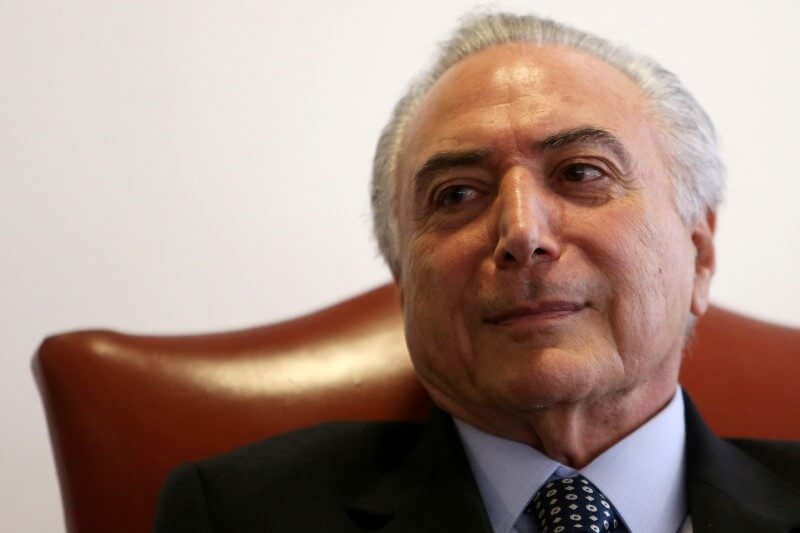By Lisandra Paraguassu
BRASILIA (Reuters) – Interim President Michel Temer believes the end of the impeachment trial of suspended President Dilma Rousseff, expected next month, will greatly boost investment and confidence in Brazil and help restore its creditworthiness. Temer told foreign reporters on Friday he expects the Senate to wrap up the trial of Rousseff by Aug. 25 or 26, and that the sooner he is confirmed as Brazil’s president for the rest of her term through 2018 the better for the country. “The world needs to know who the president of Brasil is. The impasse weakens the country,” he said.
Temer, who was Rousseff’s vice president until he took over when she was put on trial in May, said he is confident the Senate will convict her of breaking budget laws and positively assess his achievements for Brazil in more than two months at the helm. Rousseff has denied wrongdoing. Temer said he expects his proposed cap on public spending to clear Congress this year, but deeper reforms of the pension system and labor laws will be hard to pass and need more time.
Temer said he has built political stability by gathering support in Congress for his administration that will allow passage of his economic reform plan, while refraining from any spending that would worsen Brazil’s dire fiscal situation. Steps taken by his economic team led by Finance Minister Henrique Meirelles have restored confidence, he said, and Brazil should recover the investment-grade credit rating it lost last year.
As an example of renewed investor interest, Temer pointed to the $1.8 billion purchase of a controlling stake in Brazil’s largest power distributor, CPFL Energia SA by China’s State Grid International Development Ltd, the world’s largest utility. Temer hopes Congress will approve the pillar of his macroeconomic strategy to put the government’s books in order, a constitutional amendment that would put a ceiling on public spending for 10 years, before the end of the year. His transitional government has so far held off on unpopular austerity measures to avoid the risk of losing the impeachment battle to Rousseff, a leftist leader widely blamed for running Brazil’s once-booming economy into the ground. But if Temer is confirmed as president, his administration is expected to tackle deeper changes needed to plug the deficit, especially overhauling Brazil’s generous pension system that will require Brazilians to work more years. Temer plans to pull Brazil out of its worst recession since the 1930s by boosting private investment through concessions and partnerships with the state to modernize infrastructure, the sale of state assets and the opening up of the oil and gas industry, airlines and land purchases to foreign investors. “It is incredible how many useless real estate assets are owned by the state,” he told the correspondents.
Temer’s government also favors more flexible rules for the Mercosur trade bloc, a common market created by Brazil, Argentina, Uruguay and Paraguay, that he argues has held back Brazil from negotiating agreements with other nations. “We have no objection to Mercosur, but sometime we need to make tweaks to make it more flexible. Brazil cannot continue to be tied down and hindered from seeking bilateral deals,” he said. Mercosur has delayed handing the rotating presidency to its newest member, Venezuela, which faces economic collapse amidst upheaval over its leftist government’s bid to hang onto power.
Temer said he will not oppose Venezuela heading Mercosur as long as it fulfils requirements for membership of the trade bloc, which it has failed to do since joining four years ago.
(Reporting by Lisandra Paraguassú Writing by Anthony Boadle; Editing by Frances Kerry and James Dalgleish)
Temer says Brazil on track to restore investment, credibility

By Lisandra Paraguassu
















